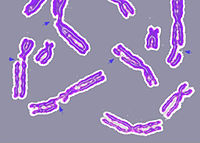
Photo from wikipedia
Antioxidant therapy is an effective approach for treating diseases in which oxidative stress is involved in the onset of symptoms. This approach aims to rapidly replenish the antioxidant substances in… Click to show full abstract
Antioxidant therapy is an effective approach for treating diseases in which oxidative stress is involved in the onset of symptoms. This approach aims to rapidly replenish the antioxidant substances in the body when they are depleted due to excess oxidative stress. Importantly, a supplemented antioxidant must specifically eliminate harmful reactive oxygen species (ROS) without reacting with physiologically beneficial ROS, which are important to the body. In this regard, typically used antioxidant therapies can be effective, but may cause adverse effects due to their lack of specificity. We believe that Si-based agents are epoch-making drugs that can overcome these problems associated with current antioxidative therapy. These agents alleviate the symptoms of oxidative-stress-associated diseases by generating large amounts of the antioxidant hydrogen in the body. Moreover, Si-based agents are expected to be highly effective therapeutic drug candidates because they have anti-inflammatory, anti-apoptotic, and antioxidant effects. In this review, we discuss Si-based agents and their potential future applications in antioxidant therapy. There have been several reports of hydrogen generation from silicon nanoparticles, but unfortunately, none have been approved as pharmaceutical agents. Therefore, we believe that our research into medical applications using Si-based agents is a breakthrough in this research field. The knowledge obtained thus far from animal models of pathology may greatly contribute to the improvement of existing treatment methods and the development of new treatment methods. We hope that this review will further revitalize the research field of antioxidants and lead to the commercialization of Si-based agents.
Journal Title: Antioxidants
Year Published: 2023
Link to full text (if available)
Share on Social Media: Sign Up to like & get
recommendations!